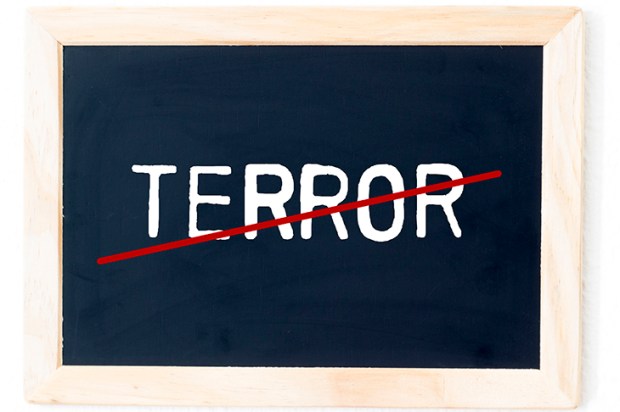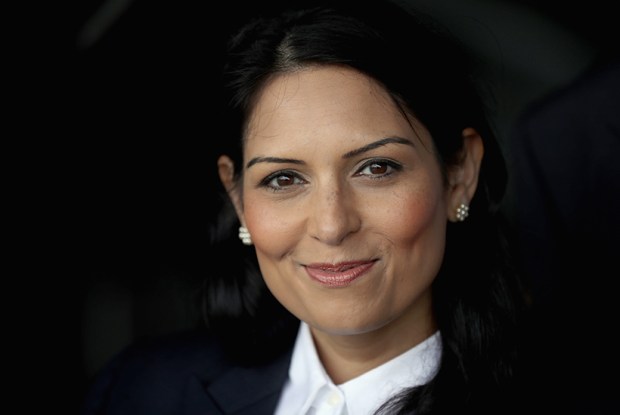Maybe I’m wrong about this, but I don’t remember the BBC running a documentary 100 days into Barack Obama’s first presidency and kicking him from pillar to post. Interviewing almost exclusively people who hated him, pouring scorn on his every utterance. They did it this week to Donald Trump, though, and even wheeled out Jeremy Paxman to present this travesty of a documentary. Because Jeremy was interviewing exclusively people with whom he wholeheartedly agreed, he didn’t get the chance to put on that famous supercilious expression we all used to love, back when he was good. Shame.
With Obama, as I remember, it was a very different approach. The studio floors were still awash with liberal ejaculate well after 100 days of his singularly inept presidency had elapsed. The establishment circle-jerking persisted right until the very end — and not just from the BBC, of course. The Nobel committee bunged Obama the Peace Prize in December 2009 for ‘reaching out to the Muslim world’ — a policy which has brought such wonderful dividends for us all. Frankly, the further you reach, the more likely you are to get your hand chopped off.
I have many reservations about The Donald, which I outlined here a couple of weeks ago — but when I see the establishment, the newish establishment, so apoplectic about his very existence, I kinda know what side I’m on. I can only hope French voters feel similarly repulsed by the multiple orgasms experienced in Brussels, Strasbourg, the BBC, by Obama and beyond, over the weirdo Manny Macron’s triumph in the presidential semi-finals. The establishment has once again banded together to tell French people how to vote in the final, and it would be truly French of the French to react by telling them to get stuffed and voting for Marine Le Pen.
If I had a vote I would have been torn between Le Pen and Mélenchon, much as I’d have been torn between Trump and Bernie Sanders. Instead, in France, the pretend anti-establishment candidate won. You can tell he’s pretend by the smirk of jubilation on the face of that arrogant and flatulent perpetually half-cut halfwit Jean-Claude Juncker. But I suppose at least Macron was savvy enough to understand that he had to present himself as anti-establishment. If you count the dupes who voted for him, more than two-thirds of the French voted for a candidate opposed to the liberal establishment, even if only nominally so in one case.
I mentioned before that with Brexit and the election of Trump and the rise of such European parties as the Front National (and Syriza and Five Star) that the old liberal (in the US sense) paradigm was in the process of being jettisoned. So it is, beyond all doubt. But the liberal establishment still has great power, if not anything remotely approaching hegemony. And so those who challenge its imprecations, its bovine shibboleths, whether from left or right, will find themselves vilified. A weight will come down, propelled by an outrage at the presumption that such a challenge could be mounted at all. Even as the establishment politicians modify their language on such stuff as immigration and Islam, so that they sound a little closer to the views of the ordinary citizen, there is still plenty of stuff which they simply cannot countenance in any form.
One of these, in this country particularly, is the dissing of homosexuality — as the Liberal Democrat leader Tim Farron discovered recently. Farron’s enormous crime in the eyes of the establishment was to refuse to deny (for a while, at least) that he thought homosexual sex was a sin. Farron is a born-again evangelical Christian, so of course he thinks homosexual sex is a sin. My guess is that this view is shared by at least 50 per cent of the population and possibly more, although they might prefer the words ‘yucky’ or ‘vile’ or ‘a bit rum’ rather than ‘sin’.
Of course Farron was immediately castigated and, being a weak little weasel, he kind of recanted a bit (Thank you, Lord Jesus!). What was interesting to me was the point-blank refusal even to consider that his view might be allowable — a view shared, to a greater or lesser degree, by a great many people. A chap called David Shariatmadari, writing in the Guardian, tried to be kind. He said we liberals should all give Timbo a break: ‘I don’t care what he considers sinful, so long as it doesn’t translate into policy. For that reason, however, he should be watched like a hawk for any hint of discriminatory law-making.’
He can think what he likes, then (for which many thanks, Mr Shariatmadari), but he should not be allowed to let this deep-rooted belief inform his politics. Instead, it is Mr Shariatmadari’s views, rather than the views of the Holy Bible, which should inform Tim Farron’s politics. This is because Mr Shariatmadari, like the rest of the liberal establishment, believes that his views count for a lot more than the Holy Bible — indeed his views are inviolable. They are all that count. And if anybody dares to disagree, they will be watched ‘like a hawk’. I don’t know what kind of hawk. Maybe a goshawk.
And yet the reason people go into politics is to articulate their points of view and convince the public of the rectitude of them. In a normal society, that would even include people who have views which differ from those of Mr Shariatmadari — they would be allowed to speak too. And enact legislation based upon those views, assuming the majority of people agreed with them. Such as on gay adoptions, for example. My guess is that if you asked in an opinion poll what the best environment would be in which to bring up a child, a huge majority would choose ‘a mother and father’. I suspect Tim Farron thinks this too. But for the liberal establishment, it is not even a question. It contravenes a shibboleth which simply cannot be challenged.
Damian Thompson and Nick Spencer discuss whether politicians are allowed to ‘do God’:
Got something to add? Join the discussion and comment below.
Get 10 issues for just $10
Subscribe to The Spectator Australia today for the next 10 magazine issues, plus full online access, for just $10.
You might disagree with half of it, but you’ll enjoy reading all of it. Try your first month for free, then just $2 a week for the remainder of your first year.















Comments
Don't miss out
Join the conversation with other Spectator Australia readers. Subscribe to leave a comment.
SUBSCRIBEAlready a subscriber? Log in